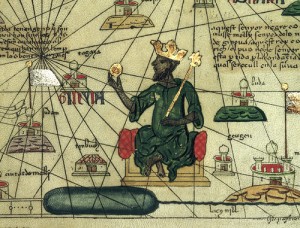Looking back into the history of Sudan and it’s great people, one can’t truly appreciate the realm and privileges of the country’s being and existence without comprehending it’s establishments and rises.. The name of the country alone represents it’s beings who inhabited the land.
 “Sudan” translated to the Arabic meaning of land of the black people. By the 6th century, the country was Christianized, then with existence dating back to c. 650, Islamization of the land arose between the eight and nineteenth century. During this time, men lived in political unity among the four-thousand mile “Valley of the Nile.” Prehistorically speaking, many evolutions of the land began extraordinarily before such era.
“Sudan” translated to the Arabic meaning of land of the black people. By the 6th century, the country was Christianized, then with existence dating back to c. 650, Islamization of the land arose between the eight and nineteenth century. During this time, men lived in political unity among the four-thousand mile “Valley of the Nile.” Prehistorically speaking, many evolutions of the land began extraordinarily before such era.
The Neolithic people first inhibited the land and survived on prehistoric materials. Living in villages of huts composed of mud and brick, conditions were less luxurious than expected. Food resulted from anything collected during hunting or fishing along the river. Grain was collected and agriculture rose for the people of the Nile river valley.
 Trade was a large aspect of the developing years of Sudan. The Egyptians would compose deals of agriculture material, such as grains, with the land of Kush for stones, incense, etc. When Egyptians began seeking a more permanent trading area, they decided for travel forts protecting the trade of gold, which was very valued to the mines in Wawat. Gold and slave trades were amongst the pharaoh’s control.
Trade was a large aspect of the developing years of Sudan. The Egyptians would compose deals of agriculture material, such as grains, with the land of Kush for stones, incense, etc. When Egyptians began seeking a more permanent trading area, they decided for travel forts protecting the trade of gold, which was very valued to the mines in Wawat. Gold and slave trades were amongst the pharaoh’s control.
 Egypt then felt more power over the area and pharaoh Ahmose arose the New Kingdom from c. 1570-1100 BC. During which time the extent of control contained Kush until the fourth cataract. The Egyptian soldiers expected devotion is exchange for respect and commitment from chiefs and kids over the pharaoh’s people.
Egypt then felt more power over the area and pharaoh Ahmose arose the New Kingdom from c. 1570-1100 BC. During which time the extent of control contained Kush until the fourth cataract. The Egyptian soldiers expected devotion is exchange for respect and commitment from chiefs and kids over the pharaoh’s people.
A language was established within the community which was used in all aspects of work, socializing, and living for the people once settled into the area. The temples of hard work and time were used for the religious worship of Christianity until diminishing after the 6th century.
Although generic information concerning the history and evolution of Sudan exist amongst the Internet in scatters, there isn’t much online or physical history to the land. I strongly believe because the history of Egypt and the Nile is so widely known and recognized, the country sitting on the other side isn’t taken into consideration or mentioned. The history was never a violent once, aside from the assumed slavery and pharaoh ruling that existed in a majority of the surrounding countries at such time. I believe although somewhat generic and peaceful, the land of Sudan be more recognized for it’s beauty and graciousness to surrounding countries and rise than be left in the dust as such.
